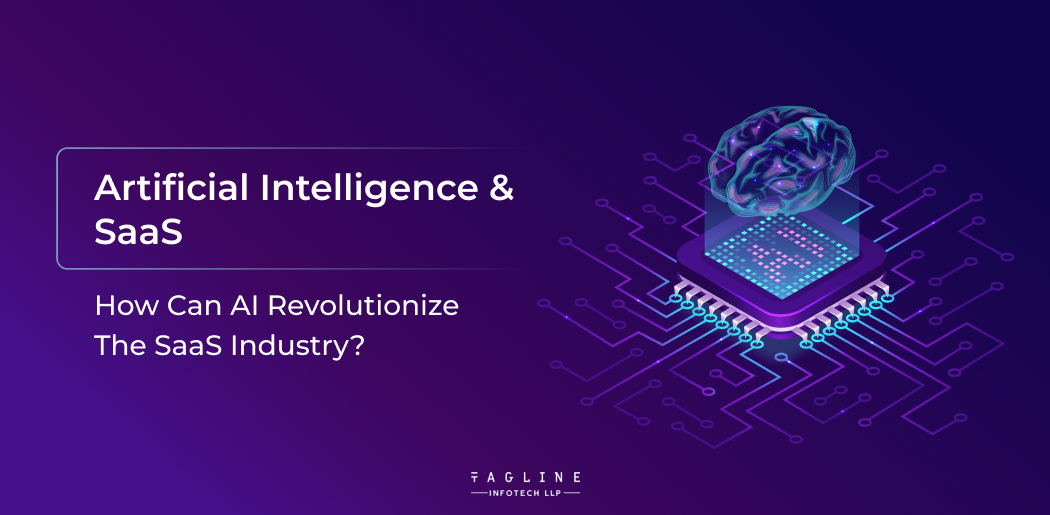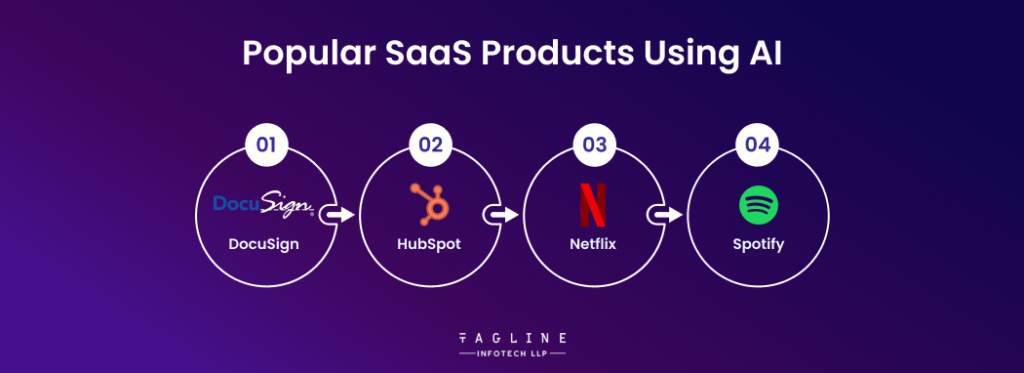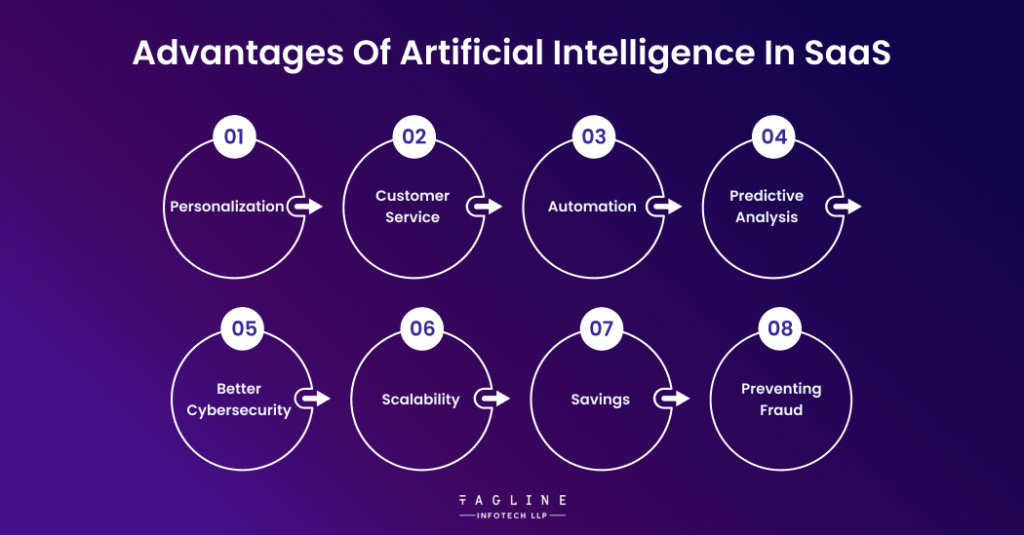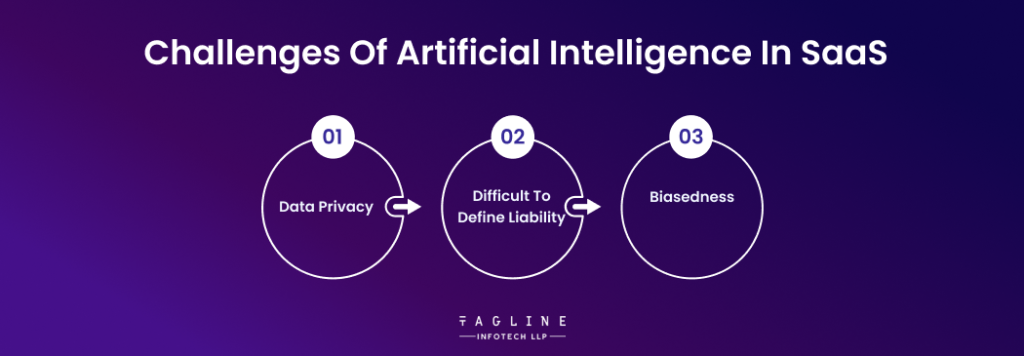What is Scalability in Cloud Computing? Types, Benefits,...
April 24, 2024
Home >> SaaS Development >> Artificial Intelligence & SaaS: How can AI revolutionize the SaaS industry?

Quick Summary
Artificial intelligence is penetrating every industry and changing how business is done. Recently, the SaaS industry has been one of the industries that have been hugely hit, and artificial intelligence is playing a significant role in its growth. Our article will help you to know about Artificial Intelligence implementation and how it can help in the development and growth of SaaS products.
Artificial Intelligence & SaaS can be seen working with many SaaS solutions to increase the capabilities for helping users receive access to new functionalities. Just like Grammarly, Artificial Intelligence is used to learn about grammar queries and also provide rectification suggestions to the users. In the same way, there are many use cases for Artificial Intelligence. Here are some of the ways that will help in using Artificial Intelligence in SaaS:
Enhanced Functionality – The users can leverage Artificial Intelligence in developing many SaaS applications to integrate the best features that can help them target the audience and adjust the user experience of the app accordingly.
Improve Efficiency – The AI also helps the users with the efficient procedure. Organizations can help in automating repetitive tasks with Artificial Intelligence and also trigger its efficiency.
Client Support – Irrespective of the domain and size of the business, client support is always an important department. AI also gives a lot of power to these SaaS businesses to automate their support system with the help of Artificial intelligence based on chatbots. The chatbots can assist clients quickly and can guide them to receive accurate solutions without any manual help.

Artificial Intelligence and SaaS are the two technologies considered powerful, and when they are used together, they will work at their best. With the help of AI for your SaaS products, you can also unlock many benefits for your organization. Let’s see how many SaaS solutions use Artificial Intelligence:
DocuSign – As a collaboration tools, we will be using tools for verifying the automated signature and boosting document security.
HubSpot – Being a feature-rich marketing tool, HubSpot uses Artificial Intelligence to impede marketing efforts.
Netflix – The platform uses Artificial intelligence for content recommendations and personalization.
Spotify – Being a music learning application it uses artificial intelligence to personlize song recommendations as required.
“Everything you need to know about developing SaaS products “
– Also Read Article

To streamline the workflows to enhance the user experience, Artificial Intelligence is transforming how we do business and creating a path for a personalized, efficient and secure future. Below, we have listed some examples of how Artificial intelligence will enhance SaaS applications
Personalization – The Artificial Intelligence algorithms are allowed to examine the user data so that you can understand their preferences and also provide many personalized suggestions. It helps create applications such as SaaS marketing automation campaigns; the personalised messaging will improve the conversion rates.
Customer Service – The usage of Artificial Intelligence in complaint management and client service is allowing businesses to minimize support tickets. Recognize potential conflict points, enabling customer service teams to concentrate on more intricate responsibilities.
Automation – Artificial Intelligence can automate repetitious tasks like report generating and data entry and help the employees to stress on more strategic functions once they are free. It can help create many SaaS Applications, such as project management, which allows automation to help you streamline workflows.
Predictive Analysis – Artificial Intelligence can analyze vast amounts of data, identifying patterns and predicting future trends. This proves especially valuable in SaaS applications like customer relationship management (CRM), where predictive analytics can pinpoint potential sales opportunities and enhance customer retention rates.
Better Cybersecurity – AI can enhance the security of SaaS applications by identifying and mitigating potential threats. This is particularly valuable in areas like cloud storage, where customer data breaches can lead to severe consequences. AI algorithms can recognize unusual user behaviour and proactively detect and respond to security threats.
Scalability – AI solutions facilitate the seamless scalability of SaaS applications by automating processes and minimizing the requirement for manual intervention. This proves highly beneficial in applications dealing with vast data volumes or intricate workflows.
Savings – Automating facilities and streamlining workflows, artificial intelligence will help in minimizing expenditure and also improving the efficiency of SaaS applications. It is better for medium and small-sized companies that lack the resources to employ an extensive workforce for managing their SaaS applications.
Preventing fraud – The spread of digital technology has also led to modern techniques con artists use to deceive people and mislead computer systems. SaaS organizations, on the other hand, can quickly identify, report, and address these types of behaviours since machine learning has been applied successfully. For example, AI can track client transactions and instantly analyze their tendencies. Artificial intelligence will thus intervene if something deviates from a customer’s usual spending pattern to ensure that only a natural person is acting.

In SaaS, artificial intelligence (AI) offers numerous potential and challenges. Among the challenges AI poses in software-as-a-service settings are the following:
Data Privacy – Artificial intelligence creates further worries about data privacy since it requires enormous amounts of data for training. Because users provide this data, concerns over their ability to protect their privacy are raised.
Difficult to define liability – The sophisticated algorithms that comprise artificial intelligence are challenging to understand. As a result, delving into the algorithm to determine who is responsible for a given action takes time and effort. Therefore, using artificial intelligence could lead to moral problems.
Biasedness – Artificial intelligence can yield discriminating outcomes when its algorithms are biased. The distribution of scores, for example, may become unbalanced when narrow artificial intelligence is used. This poses yet another difficulty in terms of SaaS and AI integration.
Take your SaaS to the next level with AI?
Hire Our AI & SaaS Developer and Lead the Innovation Charge!
The SaaS world is increasing, and the best start-ups are the ones who are always bold in adopting new technologies to take their businesses to the next level. Artificial intelligence and machine learning will make it increasingly accessible and sophisticated, and the critical opportunities for personalization and optimization will be endless.
Embracing Artificial Intelligence will allow you to provide the customer with personalized services that will enable them to crave more. Now you can say goodbye to your conventional software as Artificial Intelligence will help you achieve new profitability and success by minimizing cost, triggering innovation and improving efficiency.
Tagline Infotech is committed to providing a custom solution that aligns with your objectives and vision, guaranteeing a seamless development process from ideation to implementation. This promise is still valid whether your business is a startup or has been operating for some time.
We’ve just covered a lot of ground, so let’s take a moment to go over everything.
Artificial Intelligence (AI) has been instrumental in the ongoing growth of the software as a service (SaaS) industry, which has experienced significant expansion in recent years. Software as a service (SaaS) solutions incorporating artificial intelligence (AI) enhance user experience by optimizing onboarding procedures, leveraging conversational AI to facilitate dialogue, and providing personalized recommendations.
In addition, AI helps businesses with enhanced predictive analytics, uncovering previously unnoticed patterns and correlations, optimizing business processes, and real-time data analysis and trend identification.
Furthermore, real-time alerts and sophisticated threat detection made possible by artificial intelligence bolster the security of SaaS products. Since AI fosters business efficiency and innovation—two of the most significant factors—it is essential for the SaaS market’s future growth and success.
The most prosperous software uses AI as a service (SaaS) companies to gain a competitive edge. They use machine learning algorithms to boost organizational growth, enhance customer experiences, and automate tasks. Dennis Brown is the lead software engineer at Ling Ltd. Put simply, apply artificial intelligence to discover how your customers really utilize your product.
Businesses can improve their marketing efforts by focusing on the preferences and activities of their clients by utilizing AI in SaaS. SaaS organizations stand to gain a great deal from using machine learning algorithms to analyze client data and create tailored marketing campaigns that boost conversions and customer engagement.
Thanks to AI's capacity to analyze this data, SaaS companies can now personalize their offerings based on user behaviour, preferences, and previous data. By utilizing machine learning algorithms, SaaS companies may personalize their customer experiences, resulting in happier users and a higher chance of customers sticking with the business.

Digital Valley, 423, Apple Square, beside Lajamni Chowk, Mota Varachha, Surat, Gujarat 394101
+91 9913 808 2851133 Sampley Ln Leander, Texas, 78641
52 Godalming Avenue, wallington, London - SM6 8NW